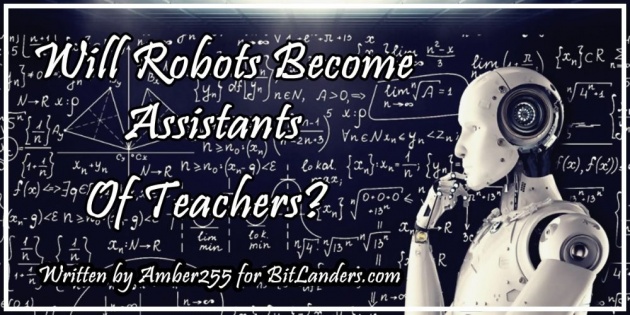
Will Robots Become Assistants Of Teachers? - Photo credit: eswarprasadguru.blogspot, edition by Amber255 via bitLanders
The development and production of the latest technology have reached its peak today and has touched on a range of areas, and education is not an exception anymore. One of the greatest sensations is the robots we are increasingly meeting in our daily lives.
Experts unequivocally state that they will fundamentally change the learning processes. We can already notice that education is becoming more and more personalized, and some of the teacher's functions are done by technology. So what is the role of a teacher in a changing school?
Electronic boards, touch panels, robots instead of teachers - such way 30 years ago science fiction writers imagined a school of the XXI century. Now this is reality. Robots become an integral part of the education system. They begin to teach, participate in educational games and even make presentations.
Credit: roboticstomorrow
Education is one of the key areas that cannot ignore the latest technology. Scientists predict that in the near future learning processes will be greatly changed by the integration of robots and various smart systems in schools.
For this reason, more and more teachers are trying to increase their digital competence in various courses. It is a must to develop such competencies for current teachers because, to improve the learning experience, schools are taming such innovations as artificial intelligence.
Can robots teach? - Video credit: youtube
What Means A Teacher's Assistant?
I believe that artificial intelligence robots that are able to adapt to the abilities and abilities of each child will soon put an end to traditional academic education.
When I say that soon robots will teach children, I do not mean a particular being who enters the classroom and starts writing something on the blackboard or calling someone to the blackboard. I am saying that this will be a robot assistant, a teacher's assistant who will help him to organize the educational space correctly, organize the interaction between the children, find an individual approach to each of them and thereby improve the educational result.
All the diversity of educational resources and practice shows that the Internet resources, automation tools, and robotization for education will actively develop but not fully replace the process of co-creation of students and teachers, joint activities, and development.
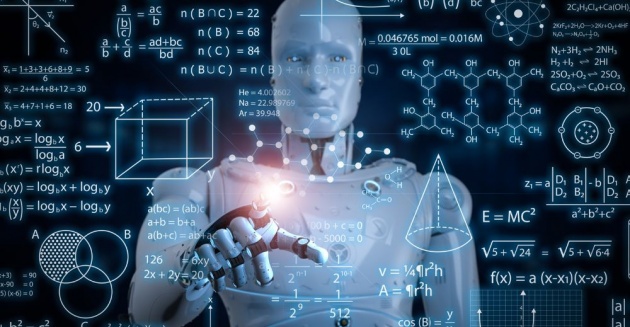
Schools robotization - Photo credit: medium
And yes, note that the teacher is also a friend and a psychologist for children, therefore he will always be in demand. A teacher is a person who is able to support and sympathize, rejoice for his student and experience a sense of pride in his every achievement.
Everything that deals with creativity, personality, motivation, critical thinking is out of the risk of being replaced by robots completely.
If we want to live among people, we must remember that man forms a man. But we can accept robots at schools in the role of teachers' assistant.
Anyway, robots are becoming a part of the education system, and that is good. They begin to lead lessons, take part in training games, and even make presentations.
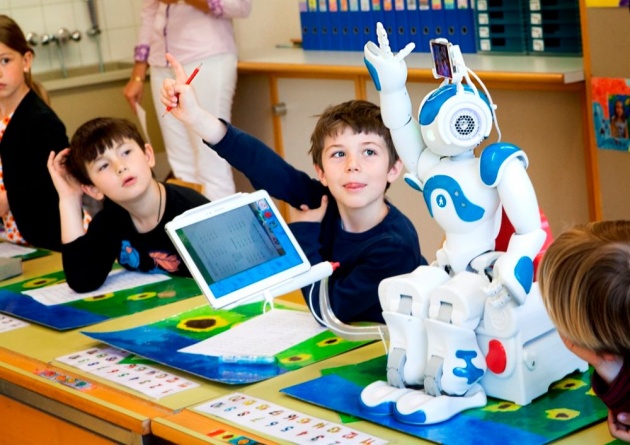
Schools robotization - Photo credit: blogs.microsoft
Schools Still Fear To Integrate Robots
The possibilities of using robots in schools are very wide. They can help educate children on exact sciences - math, physics, or even programming.
However, studies have shown that while students are happy to learn with the help of robots, teachers are still skeptical about the subject and avoid using them. Teachers should not think that robots will change their profession or complicate their work - global practice shows that robots are designed as an auxiliary and not autonomous.
While robots are capable of performing specific tasks, scientists have still not been able to create a robot that would be able to respond to complex questions or to respond to unexpected situations that good teachers are always ready to address. Today's robots also lack empathy and lack the ability to inspire students.
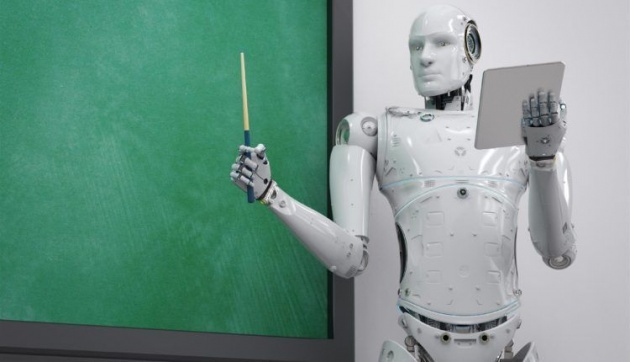
Robots in schools - Photo credit: twitter
For this and other reasons - the rising levels of unemployment and technical failures in the western states, the schools in Lithuania are not very eager to integrate robots in schools. But I have read experts' opinion that it's simply impossible to avoid changes.
It is expected that developing robots will help personalize each student's learning process by helping to select the most appropriate learning program that will best suit the student's pace.
In my opinion, with the world becoming more and more modern, the generation of current students has higher expectations, so schools need to be more prepared for technological change than before. Smart technologies, as well as robots, help to make learning more interesting, and the learning process itself - more creative, and develops different pupils' skills.
I invite you to Querlo chat - let's talk about 5 artificial intelligence applications for your smartphone:
Teachers' Work With Robots
In discussion will robots be able to completely change teachers in the future, professionals rush to calm down them: the teaching profession will certainly be needed. Of course, all the specifics of teachers' work will inevitably change as they will probably play the role of observers and decision makers.
Scientists believe that the robot could act as a second pair of hands in the classroom, primarily helping to do technical functions - such as observing the pupils' attendance. It could also help build a lessons program. Based on the available information about the pupils, the robot could autonomously browse the online learning resources to find lesson plans best suited to particular groups of pupils. This would help to cut the burden on teachers and make teaching more attractive.
It is not excluded that robots can do other functions - giving teachers more knowledge about their pupils and their needs. School classes could include language and sign recognition technologies, eye movement tracking, and other physiological sensors that collect and analyze information for each pupil.
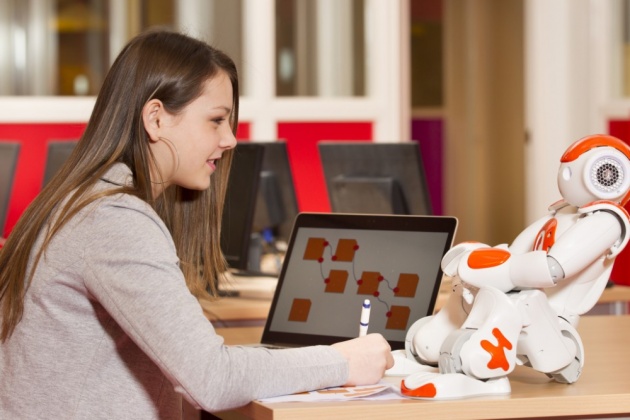
Artificial intelligence in schools - Photo credit: blog
Teachers would get real-time information - no longer have to wait for a student's lifted hands or tests to see how the pupil learns to master the information they teach.
In many countries, teachers are already starting to use robots to improve the quality of learning. For example, in the United Kingdom, autistic children and adolescents at school were using an interactive robot humanoid that helped them improve their social skills. Many children with autism have easier communication with a robot than with a teacher because they do not have different facial expressions and do not change the tone of the voice.
In Norway, robots help children who are unable to attend school due to the illness, and there is a special platform in the US and Singapore schools that allows children to create and program their own robot. I very hope that similar practices will be integrated into my county's education system in the near future too.
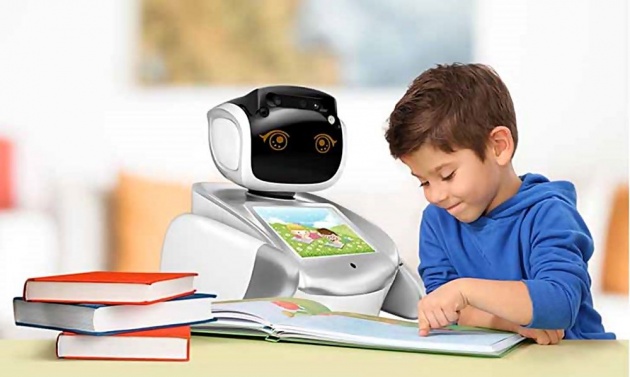
Robots teachers - Photo credit:robots.beltraocoelho
The Way Out For Teachers - To Tame The Technology
People debate whether teachers will still be needed in the future, but there is an opinion that this profession will remain. Artificial Intelligence will not pretend fully to replace the profession of teachers. But teachers will need to adapt to somewhat different working principles changed by never-ending technological development.
It will be not enough just to be able to use a computer or a smart tablet for teachers. It will be important to be able to customize the various programs for personalizing or playing programs that enable innovation. As an example, I can note virtual reality technologies, which are promising a real breakthrough in education in the near future.
Most educators already believe that this technology can have a positive impact on pupils' progress and motivation by helping to convey complex information in a simpler and easier-to-understand way. Teachers believe that virtual reality in classes will begin to be used in the next five years.
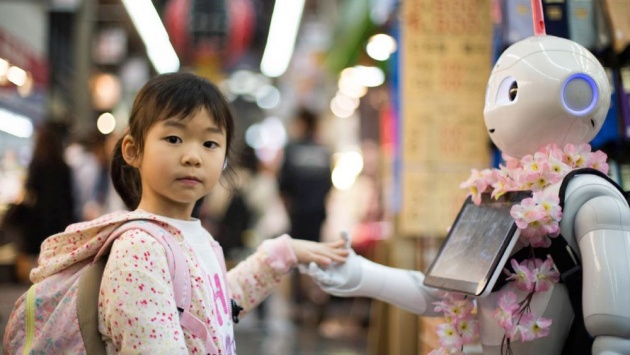
Artificial intelligence in schools - Photo credit: twitter
In any case, it is likely that it will become a daily learning tool. So to remain a professional in teachers' field, they need to do a step ahead and start making technological innovations in their schools right now.
The School Of The Future
School 2030 - what is it? How far are we from the school of the future, is this very future unattainable? Is today's school very different from school in 2030?
I remember when I was still a school pupil, once we talked with friends about the future school, how we imagine it. We joked about robotization and imagined how the robots change teachers we did not like. Then our jokes turned into serious visions. And we all imagined it the same way: the work of the school will become fully automated so that the robots replace the teachers. As we can see, our vision of the future turned out not far from today's time.
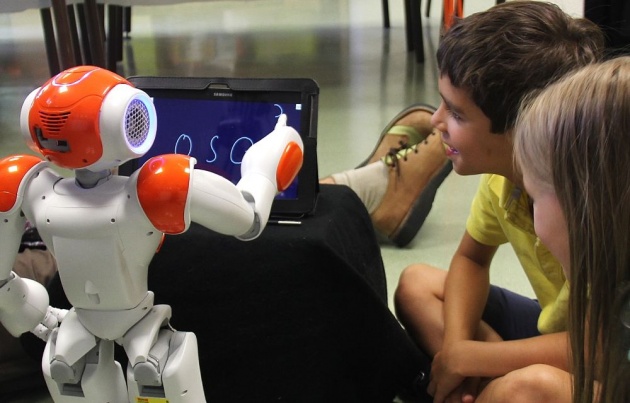
bitlanders AI-Themed Blogging: robots reachers assistants - Photo credit: twitter
And what will be like our future today? Do we need robot teachers? I think, yes. Robots could be better teachers then many people are now. And of course, they would know more than a human.
I believe that artificial intelligence robots that are able to adapt to the abilities and skills of each child will soon put an end to traditional academic education. For example, programs are already being developed in Silicon Valley that will be able to recognize the facial expressions of students, analyze the emotions and the state of children, and adapt the method of communication with each student.
The era of robots at the teacher's desk will completely abolish classes since the new learning organization will allow students to learn new materials at their own pace. Everyone will have the best teacher, and each teacher will be completely personalized, and the software will be with you throughout the study time.
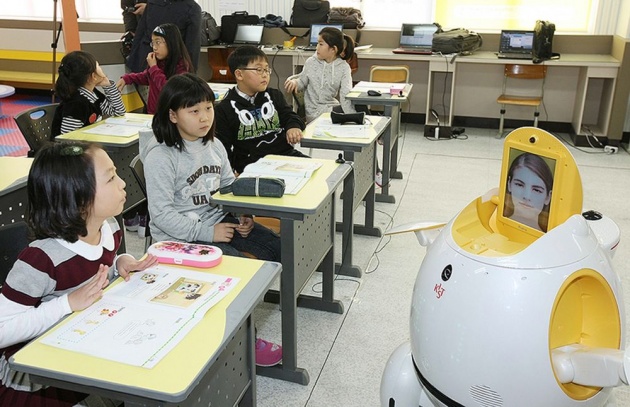
Will Robots Become Assistants Of Teachers? - Photo credit: twitter
When robots organize training, there will still be room for a teacher. Teachers will do the tasks of tutors, engage in educational activities, and be mentors of both robots and students. The machines will know almost everything about each student and will be able to build and carry out the educational trajectory of each child. Therefore, training will be as effective as possible for all students without exception.
I know that these technologies are already testing. This is happening on the west coast of the United States, and a new education is already beginning to transform schools. I expect that in the next few years, robot teachers will appear in every classroom.
Changes will occur in stages: first, robots will appear in the technical and natural science classes, and later in the humanities.
Finnish school tests new robot teaching assistants - Video credit: youtube
On A Final Note
The topic of replacing people with robots in various professions is increasingly being discussed by scientists, economists, and robotics experts. Now we can make not fantasy films but a documentary that robots will become assistants at home, in school, and at work. Today, they are loyal assistants in various fields, and education is no exception anymore. The prognosis of experts - a full-fledged era of robots will come in a couple of years.
The teacher's profession belongs to those professions where a robot cannot fully replace a person. Robots are not subject to creativity; it is impossible to replace those spheres of human life, where there is at least a drop of creativity because the creative process cannot be automated. So, the joint work of the teacher and the students will remain a process of interaction between people, not people and machines.
It is impossible to program creativity. As futurologists say - artistry, curiosity, imagination - these are qualities that are inherent only to a person but are important components of the educational process.
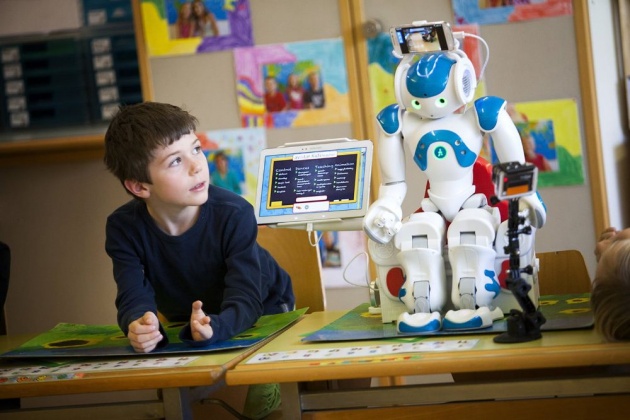
bitlanders AI-Themed Blogging: robots reachers assistants - Photo credit: blog.blended
We do not always remember exactly the information that a person tells us, but we remember the emotions and sensations that we receive during this communication. The interaction between student and teacher follows the same rules. Often the personality of the teacher, charisma, play a crucial role in the attitude of the student to the subject, and indeed to the learning process.
And that means, robots will not fully replace teachers at schools but become their assistants.
Education is one of the areas of society on which artificial intelligence has the potential to make the most positive impact.
Credit: lasserouhiainen
***************************************************************************************************
Thank you for stopping by and reading my blog.
2019, All Rights Reserved.
You are very welcome to join Bitlanders and share your valuable knowledge and opinion.
***************************************************************************************************



